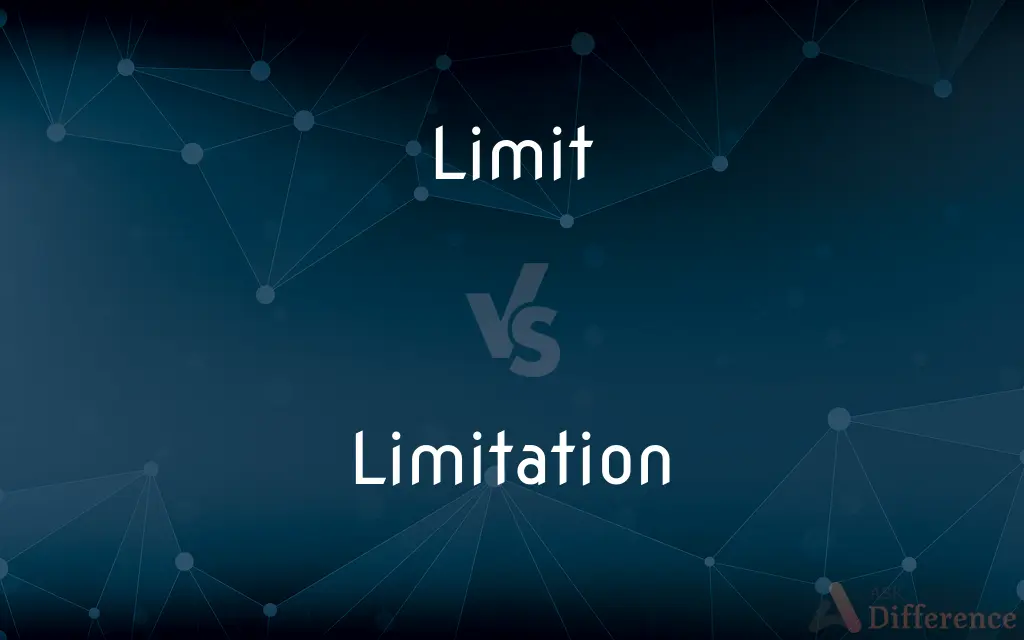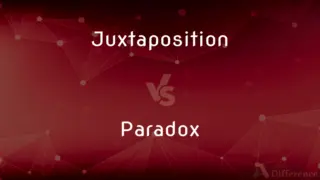Limit vs. Limitation — What's the Difference?
By Maham Liaqat & Fiza Rafique — Updated on March 28, 2024
"Limit" refers to a point or level beyond which something does not or cannot extend or pass, while "limitation" denotes a restriction or a constraint that limits freedom of action or potential.

Difference Between Limit and Limitation
Table of Contents
ADVERTISEMENT
Key Differences
A limit is a definitive endpoint or boundary, marking the maximum extent to which something can go. This term is often used in both physical and abstract contexts, such as the speed limit on a road or the limit of human endurance. On the other hand, a limitation is more about the condition of being limited and often implies a hindrance to capability or possibility. Limitations can be inherent, such as physical disabilities, or externally imposed, like legal restrictions.
Limits are typically precise and can be quantitatively measured, such as the maximum capacity of a venue or the highest score achievable in a game. In contrast, limitations may be more qualitative, reflecting broader constraints on abilities, resources, or opportunities. For instance, a person's educational background may impose limitations on their job prospects.
In mathematics and science, a limit is a fundamental concept that defines the value that a function or sequence "approaches" as the input or index approaches some point. Limitations, however, are seldom discussed in this context, as they pertain more to practical or theoretical constraints on research and experimentation, such as technological limitations or limitations in study design.
While limits can sometimes be extended or pushed forward through innovation or improvement, limitations are often viewed as more intrinsic or difficult to overcome. For example, technological advancements can increase the speed limit of vehicles by making them safer at higher speeds, but the limitation of human reaction time remains a constant concern.
Both terms suggest a stopping point, but they differ in their implications and applications. Limits are about where something ends, while limitations are about what holds something back. Understanding the difference is crucial in various fields, from engineering and science to personal development and law.
ADVERTISEMENT
Comparison Chart
Definition
A point beyond which something does not or cannot extend or pass
A restriction on freedom of action or potential
Context
Both physical and abstract, quantitatively measured
More qualitative, related to constraints on abilities or opportunities
Examples
Speed limits, capacity limits
Physical disabilities, legal restrictions
Implications
Precise endpoint, can sometimes be extended
Suggests hindrances, often intrinsic
Application
Widely used in mathematics, science, and practical scenarios
Applied to describe constraints on capabilities, resources, or conditions
Compare with Definitions
Limit
Endpoint of a range.
The temperature limit for the device's safe operation is 50°C.
Limitation
Condition of being limited.
The team worked within the limitation of tight deadlines.
Limit
Boundary condition.
They tested the material to its breaking limit.
Limitation
Inherent weakness.
The software's limitation was its incompatibility with older systems.
Limit
Restriction on action.
The company imposed a limit on travel expenses.
Limitation
Restriction affecting performance.
His lack of experience was a significant limitation.
Limit
Maximum extent allowed.
The bridge has a weight limit of 10 tons.
Limitation
Constraint on potential.
Budget limitations affected the project's scope.
Limit
Mathematical concept.
The limit of the function as x approaches infinity.
Limitation
External imposition.
Legal limitations prevent certain types of investments.
Limit
The point, edge, or line beyond which something ends, may not go, or is not allowed
The 12-mile fishing limit.
The limit of my patience.
Limitation
The act of limiting or the state of being limited
He was very successful in his limitation of salt intake.
Limit
Limits The boundary surrounding a specific area; bounds
Within the city limits.
Limitation
A limiting rule or condition; a restriction
Are there any limitations on the agreement?.
Limit
Something that restricts or restrains; a restraint
The child needs to have limits put on his behavior.
Limitation
A shortcoming or defect
We need to overcome our limitations if we want to succeed.
Limit
The greatest or least amount, number, or extent allowed or possible
A withdrawal limit of $200.
No minimum age limit.
Limitation
(Law) A period established by statute during which a lawsuit or criminal prosecution must be initiated.
Limit
(Games) The largest amount which may be bet at one time in games of chance.
Limitation
The act of limiting or the state of being limited.
Limit
A number or point L that is approached by a function f(x) as x approaches a if, for every positive number ε, there exists a number δ such that |f(x)-L| < ε if |x-a| < δ.
Limitation
A restriction; a boundary, real or metaphorical, caused by some thing or some circumstance.
Getting into his wheelchair after his amputation, it felt like a limitation you could roll in.
He understood the exam material, but his fear was a limitation he could not overcome.
Limit
A number or point L that is approached by a sequence bn if, for every positive number ε, there exists a number N such that |bn-L| < ε if n > N. Also called limit point.
Limitation
An imperfection or shortcoming that limits something's use or value.
Limit
(Informal) One that is intolerable, remarkable, or extreme in some other way
"That's the limit!" the babysitter exclaimed after the child spilled a glass of milk.
Limitation
(law) A time period after which some legal action may no longer be brought.
The lawyer obtained impunity by dragging his obviously guilty client's case beyond the ten-year limitation.
Limit
To confine or restrict with a limit
Let's limit the discussion to what is doable. The offer limits us to three for a dollar.
Limitation
The act of limiting; the state or condition of being limited; as, the limitation of his authority was approved by the council.
They had no right to mistake the limitation . . . of their own faculties, for an inherent limitation of the possible modes of existence in the universe.
Limit
A restriction; a bound beyond which one may not go.
There are several existing limits to executive power.
Two drinks is my limit tonight.
Limitation
That which limits; a restriction; a qualification; a restraining condition, defining circumstance, or qualifying conception; as, limitations of thought.
The cause of error is ignorance what restraints and limitations all principles have in regard of the matter whereunto they are applicable.
Limit
(mathematics) A value to which a sequence converges. Equivalently, the common value of the upper limit and the lower limit of a sequence: if the upper and lower limits are different, then the sequence has no limit (i.e., does not converge).
The sequence of reciprocals has zero as its limit.
Limitation
A certain precinct within which friars were allowed to beg, or exercise their functions; also, the time during which they were permitted to exercise their functions in such a district.
Limit
(mathematics) Any of several abstractions of this concept of limit.
Category theory defines a very general concept of limit.
Limitation
A limited time within or during which something is to be done.
You have stood your limitation, and the tribunesEndue you with the people's voice.
Limit
(category theory) The cone of a diagram through which any other cone of that same diagram can factor uniquely.
Limitation
A certain period limited by statute after which the claimant shall not enforce his claims by suit.
Limit
(poker) Fixed limit.
Limitation
A principle that limits the extent of something;
I am willing to accept certain restrictions on my movements
Limit
The final, utmost, or furthest point; the border or edge.
The limit of a walk, of a town, or of a country
Limitation
The quality of being limited or restricted;
It is a good plan but it has serious limitations
Limit
(obsolete) The space or thing defined by limits.
Limitation
The greatest amount of something that is possible or allowed;
There are limits on the amount you can bet
It is growing rapidly with no limitation in sight
Limit
(obsolete) That which terminates a period of time; hence, the period itself; the full time or extent.
Limitation
(law) a time period after which suits cannot be brought;
Statute of limitations
Limit
(obsolete) A restriction; a check or curb; a hindrance.
Limitation
An act of limiting or restricting (as by regulation)
Limit
A determining feature; a distinguishing characteristic.
Limit
(cycling) The first group of riders to depart in a handicap race.
Limit
A person who is exasperating, intolerable, astounding, etc.
Limit
(poker) Being a fixed limit game.
Limit
(transitive) To restrict; not to allow to go beyond a certain bound, to set boundaries.
We need to limit the power of the executive.
I'm limiting myself to two drinks tonight.
Limit
To have a limit in a particular set.
The sequence limits on the point a.
Limit
(obsolete) To beg, or to exercise functions, within a certain limited region.
A limiting friar
Limit
That which terminates, circumscribes, restrains, or confines; the bound, border, or edge; the utmost extent; as, the limit of a walk, of a town, of a country; the limits of human knowledge or endeavor.
As eager of the chase, the maidBeyond the forest's verdant limits strayed.
Limit
The space or thing defined by limits.
The archdeacon hath divided itInto three limits very equally.
Limit
That which terminates a period of time; hence, the period itself; the full time or extent.
The dateless limit of thy dear exile.
The limit of your lives is out.
Limit
A restriction; a check; a curb; a hindrance.
I prithee, give no limits to my tongue.
Limit
A determining feature; a distinguishing characteristic; a differentia.
Limit
A determinate quantity, to which a variable one continually approaches, and may differ from it by less than any given difference, but to which, under the law of variation, the variable can never become exactly equivalent.
Limit
To apply a limit to, or set a limit for; to terminate, circumscribe, or restrict, by a limit or limits; as, to limit the acreage of a crop; to limit the issue of paper money; to limit one's ambitions or aspirations; to limit the meaning of a word.
Limit
To beg, or to exercise functions, within a certain limited region; as, a limiting friar.
Limit
The greatest possible degree of something;
What he did was beyond the bounds of acceptable behavior
To the limit of his ability
Limit
Final or latest limiting point
Limit
The boundary of a specific area
Limit
As far as something can go
Limit
The mathematical value toward which a function goes as the independent variable approaches infinity
Limit
The greatest amount of something that is possible or allowed;
There are limits on the amount you can bet
It is growing rapidly with no limitation in sight
Limit
Place limits on (extent or access);
Restrict the use of this parking lot
Limit the time you can spend with your friends
Limit
Restrict or confine,
I limit you to two visits to the pub a day
Limit
Decide upon or fix definitely;
Fix the variables
Specify the parameters
Common Curiosities
How is the concept of a limit used in mathematics?
In mathematics, a limit refers to the value that a function or sequence approaches as the input or index approaches some value.
Are all limitations negative?
Not necessarily; some limitations can serve protective roles or encourage creative solutions to challenges.
Can limits be changed?
Yes, limits can sometimes be extended or modified with innovation or changes in conditions, unlike many limitations which are more intrinsic.
How do scientists deal with limitations in their research?
Scientists address limitations by acknowledging them in their work, designing studies to minimize their impact, and suggesting areas for future research.
How do limitations affect personal growth?
Limitations can constrain personal growth by restricting opportunities, abilities, or resources, but overcoming them can also lead to significant development.
Do limitations always stem from external factors?
No, limitations can be either external (like legal restrictions) or internal (such as physical or psychological barriers).
Can technological advances remove limitations?
Technological advances can mitigate or even remove some limitations, especially those related to physical or practical constraints.
What is the difference between a limit and a limitation?
A limit is a definitive point beyond which something cannot go, while a limitation is a restriction that constrains ability or potential.
What role do limits and limitations play in goal setting?
Understanding both helps in setting realistic goals and identifying what may hinder or facilitate reaching those goals.
Can a limitation become a limit?
Conceptually, a limitation could set a de facto limit in certain contexts, though the terms maintain distinct meanings.
Is a speed limit a limit or a limitation?
A speed limit is a type of limit imposed to regulate traffic speed, but it can also be seen as a limitation on how fast a vehicle is legally allowed to travel.
How can one overcome personal limitations?
Through self-awareness, education, perseverance, and sometimes with the help of technology or therapy, depending on the nature of the limitation.
How do legal limitations affect businesses?
Legal limitations can restrict how businesses operate, what they can sell, and where they can expand, among other things.
Are there limitations in physical laws?
Yes, physical laws, such as the speed of light, impose fundamental limitations on what is possible within our universe.
Is aging considered a limit or a limitation?
Aging can be viewed as both a limit on lifespan and a limitation in terms of physical and sometimes cognitive abilities as one grows older.
Share Your Discovery

Previous Comparison
Juxtaposition vs. Paradox
Next Comparison
Saxello vs. SaxophoneAuthor Spotlight
Written by
Maham LiaqatCo-written by
Fiza RafiqueFiza Rafique is a skilled content writer at AskDifference.com, where she meticulously refines and enhances written pieces. Drawing from her vast editorial expertise, Fiza ensures clarity, accuracy, and precision in every article. Passionate about language, she continually seeks to elevate the quality of content for readers worldwide.














































